I am trying to generate Jacoco code coverage report. I have used AndroidTestCase for my test classes.
I have found using testCoverageEnabled true and using default android -studio default jacoco, ./gradlew connectedCheck or createDebugCoverageReport create the percentage of successfull/fail test cases, but no coverage report.
Then I have tried jacoco {toolVersion "0.7.1.201405082137"}, and task jacocoTestReport(type:JacocoReport, dependsOn: "testDebug"). I have tried to change the dependsOn value with various task. The report shows 0 (zero) test coverage, which is impossible because at least half of all classes are tested.
I have followed various accepted answer of stack overflow in last couple of days. The result is negative.
My gradle file:
buildscript {
repositories {
mavenLocal()
mavenCentral()
}
dependencies {
classpath 'com.android.tools.build:gradle:1.0.0'
}
}
apply plugin: 'com.android.application'
apply plugin: 'jacoco'
android {
compileSdkVersion 21
buildToolsVersion "21.1.2"
defaultConfig {
applicationId "test.gradle.com.myapplicationtestgradle"
minSdkVersion 21
targetSdkVersion 21
versionCode 1
versionName "1.0"
}
buildTypes {
release {
minifyEnabled false
proguardFiles getDefaultProguardFile(
'proguard-android.txt'), 'proguard-rules.pro'
}
debug {
testCoverageEnabled true
}
}
jacoco {
version "0.7.1.201405082137"
}
packagingOptions {
exclude 'LICENSE.txt'
}
}
jacoco {
toolVersion "0.7.1.201405082137"
}
task jacocoTestReport(type:JacocoReport, dependsOn: "testDebug") {
group = "Reporting"
description = "Generate Jacoco coverage reports"
// exclude auto-generated classes and tests
def fileFilter = ['**/R.class', '**/R$*.class',
'**/BuildConfig.*', '**/Manifest*.*',
'android/**/*.*']
def debugTree = fileTree(dir:
"${project.buildDir}/intermediates/classes/debug",
excludes: fileFilter)
def mainSrc = "${project.projectDir}/src/main/java"
sourceDirectories = files([mainSrc])
classDirectories = files([debugTree])
additionalSourceDirs = files([
"${buildDir}/generated/source/buildConfig/debug",
"${buildDir}/generated/source/r/debug"
])
executionData = fileTree(dir: project.projectDir, includes:
['**/*.exec', '**/*.ec'])
reports {
xml.enabled = true
xml.destination = "${buildDir}/jacocoTestReport.xml"
csv.enabled = false
html.enabled = true
html.destination = "${buildDir}/reports/jacoco"
}
}
dependencies {
compile fileTree(dir: 'libs', include: ['*.jar'])
androidTestCompile('junit:junit:4.11') {
exclude module: 'hamcrest-core'
}
}


